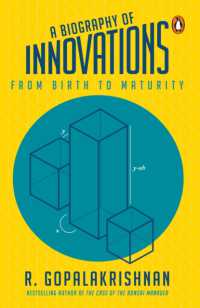- ホーム
- > 洋書
- > 英文書
- > Politics / International Relations
Full Description
Toleration is one of the most studied concepts in contemporary political theory and philosophy, yet the range of contemporary normative prescriptions concerning how to do toleration or how to be tolerant is remarkably narrow and limited. The literature is largely dominated by a neo-Kantian moral-juridical frame, in which toleration is a matter to be decided in terms of constitutional rights. According to this framework, cooperation equates to public reasonableness and willingness to engage in certain types of civil moral dialogue. Crucially, this vision of politics makes no claims about how to cultivate and secure the conditions required to make cooperation possible in the first place. It also has little to say about how to motivate one to become a tolerant person. Instead it offers highly abstract ideas that do not by themselves suggest what political activity is required to negotiate overlapping values and interests in which cooperation is not already assured. Contemporary thinking about toleration indicates, paradoxically, an intolerance of politics.
Montaigne and the Tolerance of Politics argues for toleration as a practice of negotiation, looking to a philosopher not usually considered political: Michel de Montaigne. For Montaigne, toleration is an expansive, active practice of political endurance in negotiating public goods across lines of value difference. In other words, to be tolerant means to possess a particular set of political capacities for negotiation. What matters most is not how we talk to our political opponents, but that we talk to each other across lines of disagreement. Douglas I. Thompson draws on Montaigne's Essais to recover the idea that political negotiation grows out of genuine care for public goods and the establishment of political trust. He argues that we need a Montaignian conception of toleration today if we are to negotiate effectively the circumstances of increasing political polarization and ongoing value conflict, and he applies this notion to current debates in political theory as well as contemporary issues, including the problem of migration and refugee asylum. Additionally, for Montaigne scholars, he reads the Essais principally as a work of public political education, and resituates the work as an extension of Montaigne's political activity as a high-level negotiator between Catholic and Huguenot parties during the French Wars of Religion. Ultimately, this book argues that Montaigne's view of tolerance is worth recovering and reconsidering in contemporary democratic societies where political leaders and ordinary citizens are becoming less able to talk to each other to resolve political conflicts and work for shared public goods.
Contents
Introduction: Negotiating Tolerance
Chapter 1: Montaigne's Political Style
Chapter 2: The Pleasure of Diversity
Chapter 3: The Power of Uncivil Conversation
Chapter 4: Exiting the Marketplace of Intolerance
Chapter 5: Radical Moderation
Conclusion: Justice and Public Reason
Notes
Bibliography
Index








